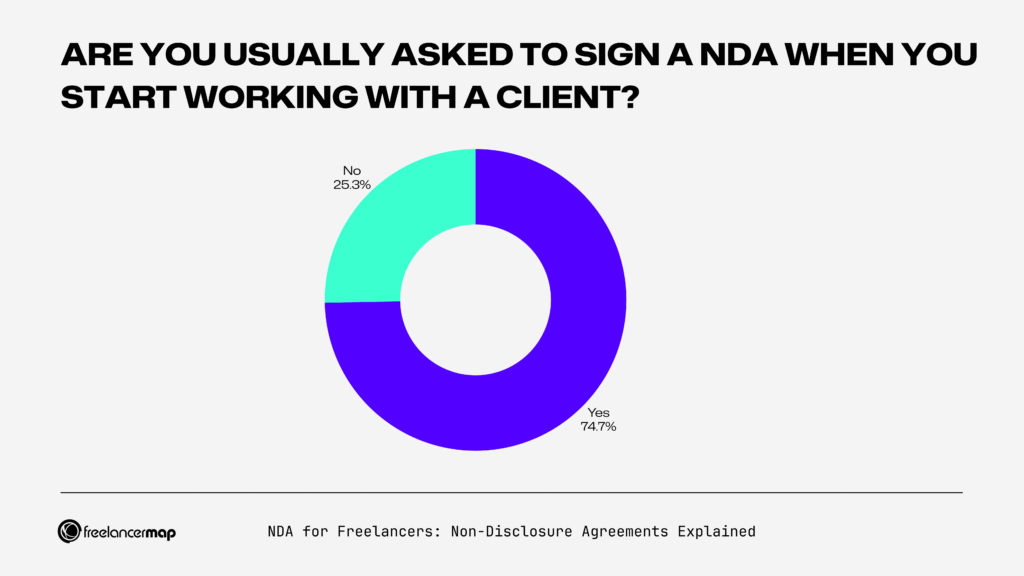 with a client " width="1024" height="576" />
with a client " width="1024" height="576" />As a freelancer, there is a high possibility of having to work under the constraints of an NDA (Non-Disclosure Agreements in full). NDAs are a standard practice when working on sensitive projects with clients who necessitate discretion.
While they may be common in the freelancing industry, NDA contracts may contain jargon you are not familiar with. Legal language is often pretty scary and signing a contract you don’t understand entirely can feel like jumping into open waters unarmed.
It’s important to understand the confidentiality clause to know how best to go about agreeing to one.
Read on to learn:
NDA stands for non-disclosure agreement and it’s also known as secrecy agreement, proprietary information agreement, or confidentiality agreement. It’s a legal document that serves to protect confidential information between two contracting parties.
The NDA is often signed in advance of contract negotiations, or in the case of a merger of companies when business partners share sensitive information with each other. This can involve patents, documents, and other corporate data that shouldn’t be public. Anyone who signs an NDA undertakes to maintain confidentiality with regard to this information.
For freelancers, NDAs are usually asked to be signed when their work is involved in a new product or service launch or if they have access to any other confidential information.
Join our freelancer community today!
Create your profile in just 2 minutes and start attracting new clients.
The contracting parties define the confidential information, but also the sections that are not subject to the confidentiality agreement. In addition, they also define how high penalties will be imposed if one party violates the contract and how long the confidentiality agreement is valid. The term “confidential information” should be defined in the agreement as precisely as possible and as generally as necessary.
Too narrow a definition might not cover certain infringements, whereas too broad a definition might invalidate the contract if it unduly penalizes the party obliged to maintain confidentiality. The clause does not cover information that is already publicly known or where the freelancer is not responsible for its publication. Also, data that might be requested legally are not affected by the agreement.
A non-disclosure agreement exists to protect information about the client and about how they conduct business. This could refer to a concept, idea, content, databases containing confidential information, an invention, or even a process your client employs in the operation of their business.
Since freelancers usually work with several clients at the same time, it’s important for clients to protect information about their company that they deem confidential.
What’s the reality among freelancers? Are they usually asked to sign these clauses before starting on a new project?
 with a client " width="1024" height="576" />
with a client " width="1024" height="576" />
We asked our freelancers and 74.7% confirmed that they are usually asked to sign a non-disclosure agreement before they start working with a client.
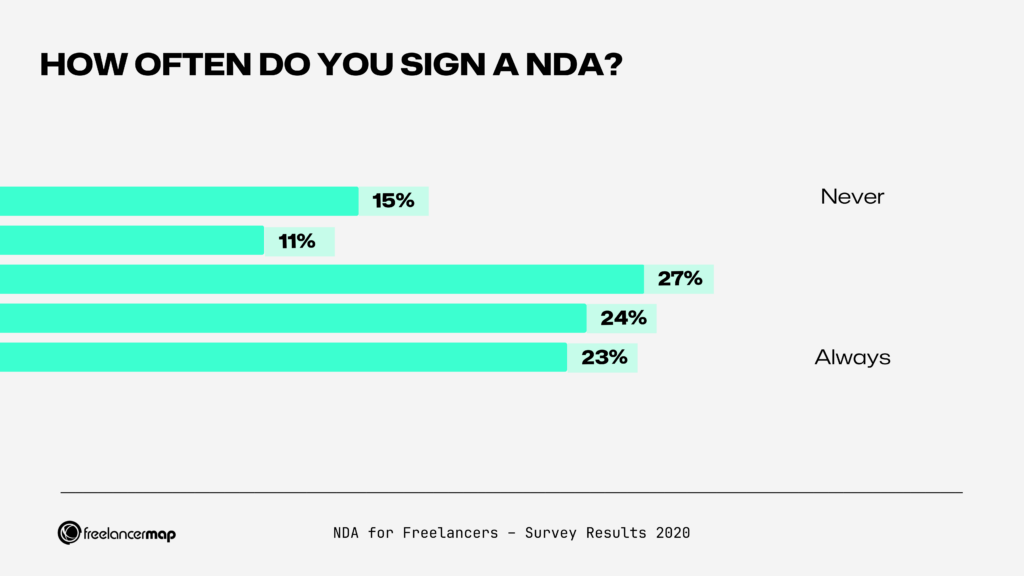
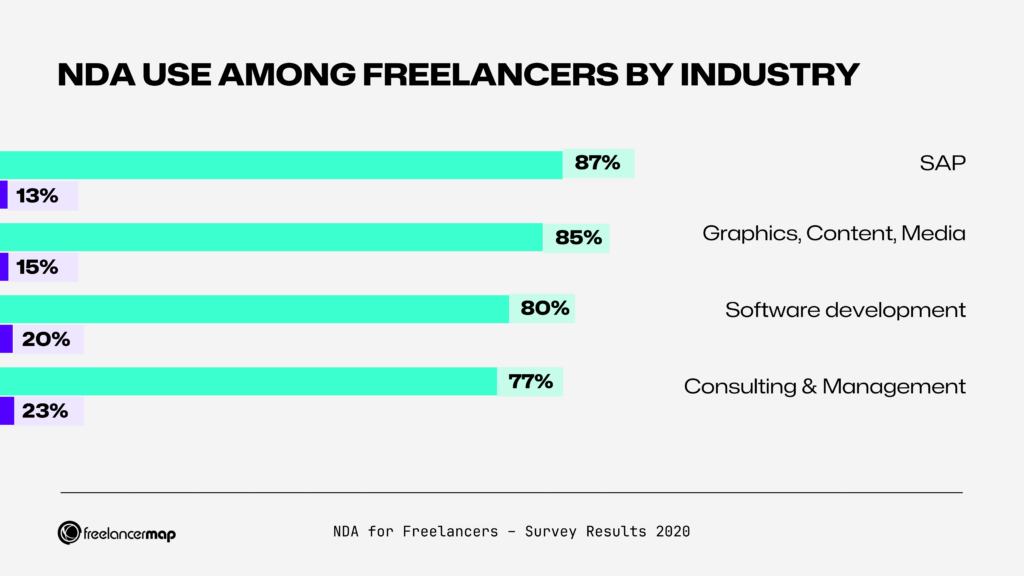 Non-disclosure and confidentiality agreement for freelancers – Survey results – May 2020
Non-disclosure and confidentiality agreement for freelancers – Survey results – May 2020
Only 14.8% of freelancers said to never have used such agreements.
If we take a look at the survey results by working industry, we see that freelancers working in the SAP field and those in the creative industry – graphic, content, design – are the freelancers who are most often asked to sign confidentiality agreements (87.5% and 84.6% respectively).
There are a couple of things that each and every NDA has. Firstly, it defines confidential information to be protected. This part is often vague because explicitly mentioning secrets defeats the purpose of the whole NDA. It can include things such as “innovative processes”, but also obvious stuff like sales figures or customer information.
Exclusions are also an important part of the NDA – they specify the parts of the aforementioned information that are excluded from the written agreement.
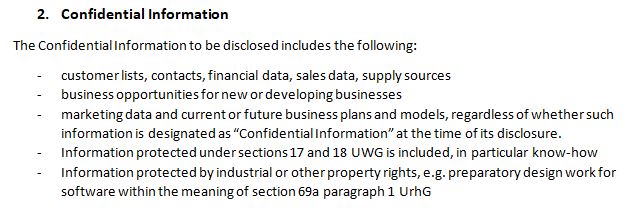
Most NDAs include a time frame – information is rarely protected forever, rather just a number of months/years you and your client agreed upon, for example, until the product is released and the information about it is made public.
Tip: If you are asked to sign an NDA without termination date, we’d recommend you to ask your client to add a reasonable time limit to the agreement. Your client may want to keep that information confidential for as long as possible, but you might want to limit your obligations.
Last but not least, confidentiality agreements will precisely spell out the people which are made privy to the information and obligated to keep it secret.
This means that if you are working with any subcontractor or otherwise receiving help on the project at hand, your client must be informed so that the additional persons may be included in the legal document.
Important parts and information of an NDA:
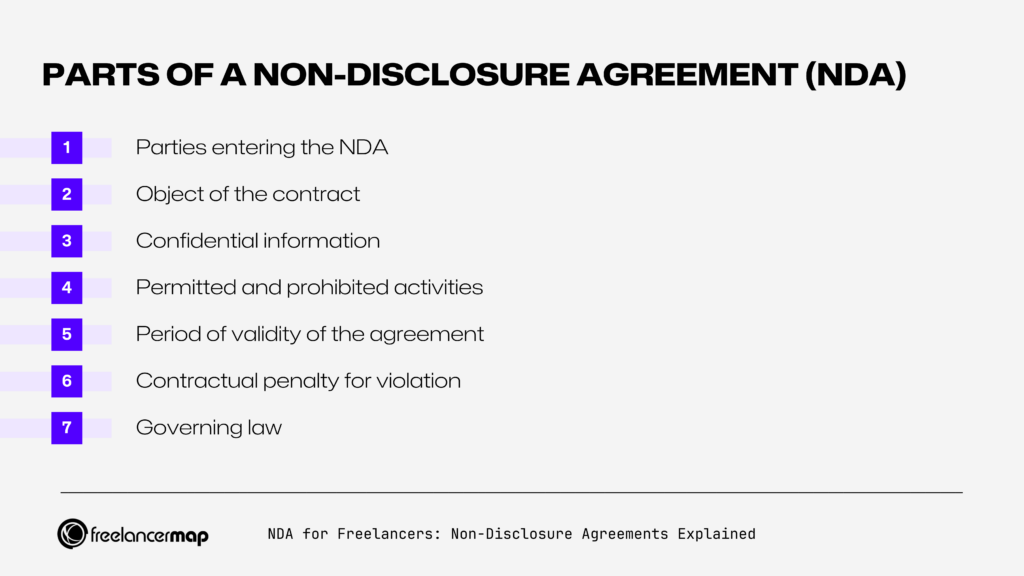
By being willing to sign an NDA, you show your client that you have a deep regard for their work and their need to keep things confidential. It allows clients to feel more confident about sharing information in turn, allowing a freelancer to complete a project successfully.
Sometimes though, NDAs can be tricky. For example, some companies will try to limit the work scope of the project you are working on. While this is acceptable in most cases, there needs to be a limit.
Not being allowed to include the project in your portfolio or résumé is something that you should try to avoid agreeing to. Talk to your client and discuss potential workarounds that allow you to share some form of your work when working with an NDA.
NDAs can be a legitimate way for clients to protect their private information in turn allowing a client to feel at ease when working with a freelancer.
This is especially important for clients working with freelancers for the first time – NDAs are a great way to build trust.
On the other hand, enforcing NDA agreements can often be complicated (and expensive) in the unfortunate event of a contract breach. And so clients should still limit the information that they decide to share with their freelancer and ensure their NDA is a fool-proof contract.
NDA should be individual to each situation. For example, an NDA for designers would be different than an NDA for a sales manager.
No matter the niche, we always recommend freelancers to enlist the help of a lawyer to go through any clause or legal document they feel insecure about (as far as it’s possible for them).
Here’s a simple NDA sample that you can use as an example or as the base of a new agreement:
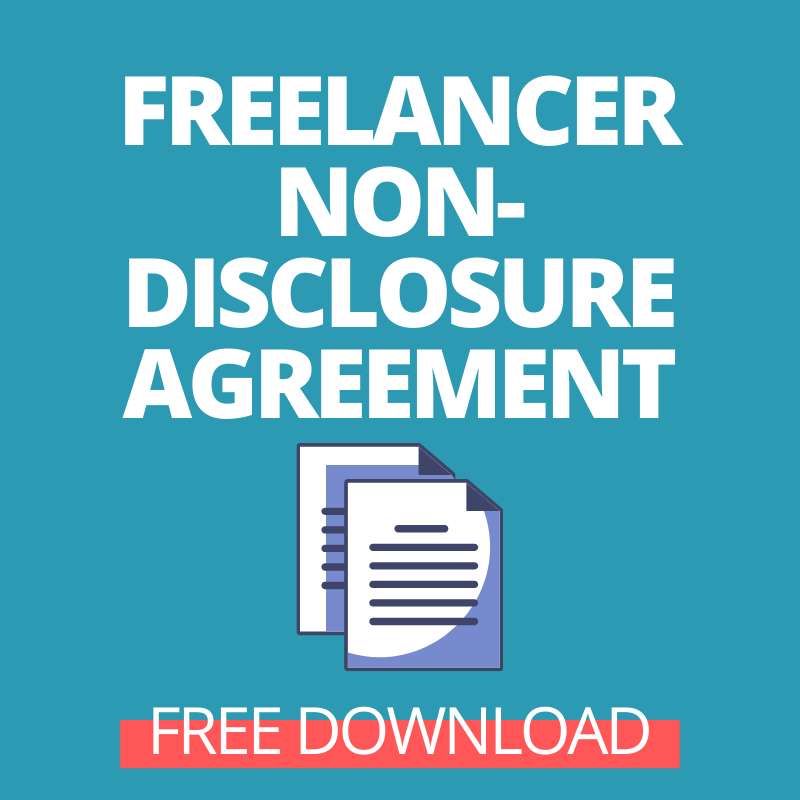
Signing contracts is a serious part of freelancing and should not be done lightheartedly. Freelancers should carefully review any NDA they get and consult a lawyer if they feel unsure about what it covers.
Deciding whether or not to sign an NDA will get easier with time as you establish what you are willing to consider and what you would rather not do.
As always, feel free to share your experience with your fellow freelancers in the comment section below!
Disclosure: The material available in this article is for informational purposes only. We recommend you contact an attorney for legal advice regarding any particular issue or problem with a non-disclosure agreement.
 land new clients a 0% commission fees" width="1024" height="297" />
land new clients a 0% commission fees" width="1024" height="297" />
You might also like:
Natalia is part of the international team at freelancermap. She loves the digital world, social media and meeting different cultures. Before she moved to Germany and joined the freelancermap team she worked in the US, UK and her home country Spain. Now she focuses on helping freelancers and IT professionals to find jobs and clients worldwide at www.freelancermap.com
You have given some great insights Natalia! I feel when a freelancer signs an NDA with a company, it is also a sign of respect. It tells that they are quite eager to work with them!
Natalia Campana says:Thanks, George! NDAs are something most companies like and can show the freelancer’s commitment to the project. However, everybody must understand the agreement they are entering, and there should be no abusive clauses.